Ron Barassi: 31 moments that defined an AFL/VFL great
Ron Barassi will be remembered as one of the greatest figures in the history of the VFL/AFL. GLENN MCFARLANE looks at the 31 moments that defined the man who made the No. 31 his own.
AFL
Don't miss out on the headlines from AFL. Followed categories will be added to My News.
Glenn McFarlane takes a look back at 31 key moments in the life of Ronald Dale Barassi, who died, aged 87, on Saturday.
1. Ronald Dale Barassi is born at Castlemaine Hospital on February 27, 1936.
2. His father, Ronald James Barassi, who had played in Melbourne’s 1940 premiership side, is killed at Tobruk on July 31, 1941, aged 27. Barassi is only five.
3. His mother remarries and moves to Tasmania. As Barassi is playing with Melbourne under-19s in 1952, he moves in with the club’s senior coach, Norm Smith, in Pascoe Vale, who would become his mentor.
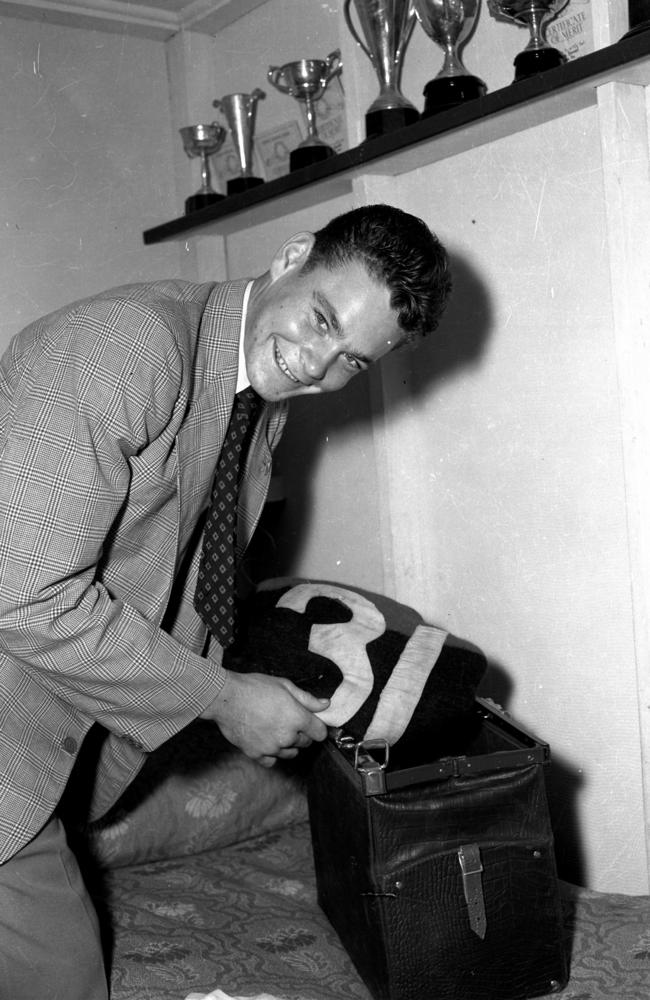
4. He is named 19th man (reserve) for the Melbourne senior team at the age of 17 years and 79 days against Footscray in Round 4, 1953. Wearing his father’s No. 31, he spends the entire game on the bench. Plays his first full game against St Kilda in Round 11, 1953, and is named among the best players
5. After starting as a forward, Barassi helps to revolutionise the ruck-rover role in 1954 and beyond.
6. He is one of the Demons’ best in his first VFL premiership in 1955. “I was pretty nervous, but as it turned out, we beat Collingwood pretty easily,” Barassi recalled.
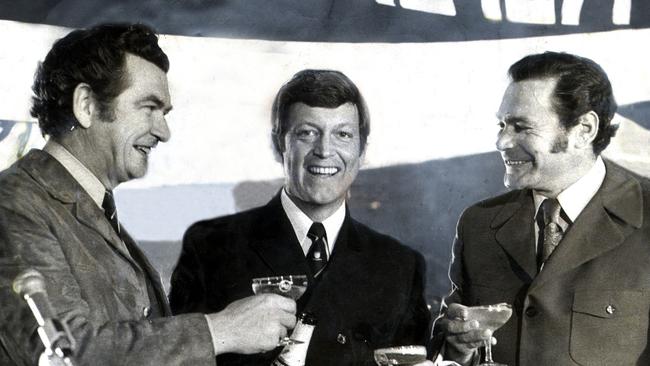
7. Is selected to play for Victoria for the first time in 1956 — as a 20-year-old — and arrives home to be congratulated by Norm Smith, captured in a famous photograph.
8. Announces himself as a big-game player, kicking three goals as one of the best on the ground, in Melbourne’s 1956 premiership triumph over Collingwood in front of 115,902 at the MCG. “I’ll never forget the roar of the crowd … this was the first time more than 100,000 had attended a Grand Final.”
9. Melbourne wins a third straight flag in 1957 — over Essendon — and he is captured in another iconic image when kicking a goal despite a desperate tackle from Bomber Bob Suter. The pair recreate the image 50 years later.
10. He is targeted physically by Collingwood’s Barry “Hooker” Harrison in the 1958 Grand Final and, to his lasting regret, the Demons lose in one of the greatest upsets in the game’s history. “Perhaps, one day, when we are all in heaven, and we have our bodies back to what they were, we might have a rematch,” he would say half a century later.
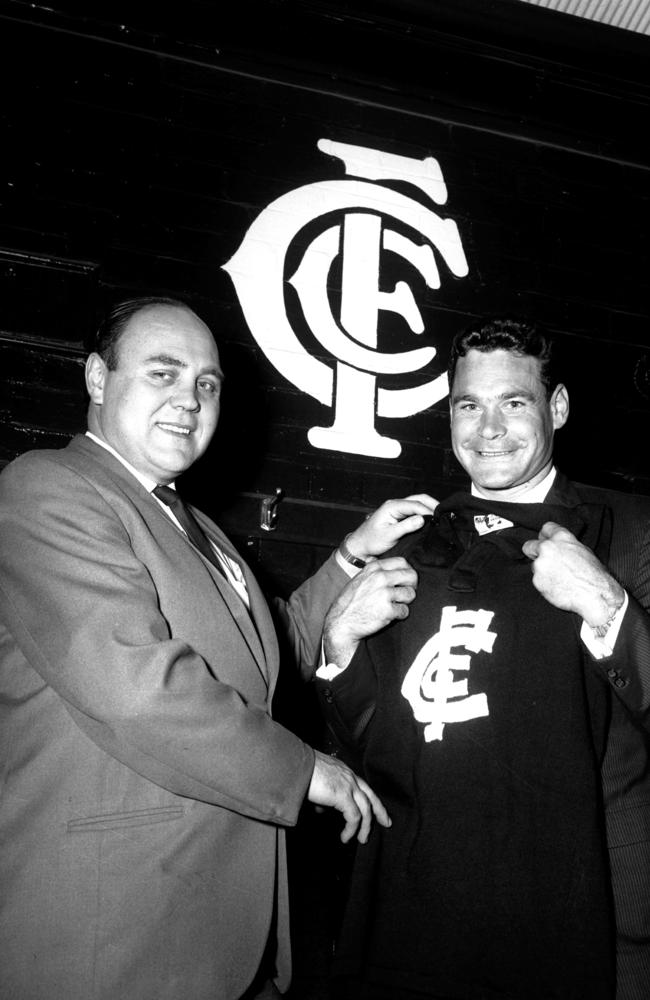
11. In a match dubbed “Barassi’s premiership”, he is acknowledged as best on ground in the 1959 Grand Final against Essendon.
12. He is named captain of the Melbourne Football Club for the 1960 season, aged 24. The Demons take revenge on Collingwood when he leads Melbourne to the 1960 premiership. He would say of that match: “I don’t think I have ever seen such maniacal concentration on the matter at hand as I did for the Melbourne team in the 1960 Grand Final.”
13. Plays his 204th and final game for Melbourne in the 1964 Grand Final, winning his sixth flag as a player. Also wins the best-and-fairest for a second time.
14. Football’s biggest bombshell is announced in December 1964 when Carlton appoints Barassi as its playing coach. Melbourne fans are in tears, including one who had trained her parrot to say, “C’mon Ron.”
15. The Blues take out a £25,000 life insurance policy on Barassi and almost need it when he is stuck on a mountain in New Zealand on a training camp at the end of 1965. One headline screams: “Barassi near death on a mountain”, even if he maintained that was a little exaggerated.
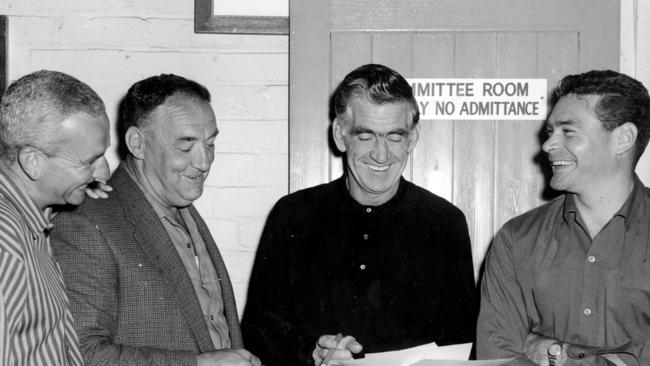
16. Is dropped from the team by the Carlton match committee ahead of the 1968 finals. “It was a real shock for me … (but) I think it showed the strength of the Carlton club. It showed that the match committee was not made up of ‘yes’ men,” he said. But he ends up coaching the Blues to their first flag since 1947, and it is his first premiership success as coach
17. Plays his final game — fittingly against Melbourne — in Round 7, 1969, his 50th for Carlton, and 254th overall. Tears a hamstring early.
18. Orchestrates footy’s greatest Grand Final comeback with a halftime plan to “handball, handball, handball” after Carlton trailed Collingwood by 44 points in 1970. The Blues win by 10 points and his coaching legend grows.
19. Quits as Carlton coach 12 months later after the Blues fail to make the finals in 1971, saying he has had enough of football.
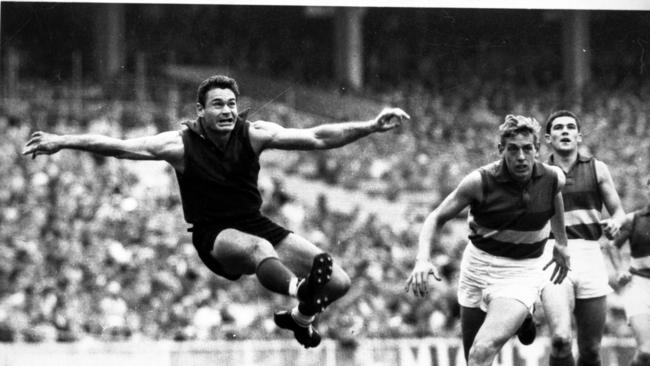
20. Is courted back to coaching by lowly North Melbourne in 1973, signing a lucrative contract on the back of a serviette.
21. The Kangaroos lose their first four games in 1975, but he lifts the team off the canvas to get them back on track. Coaches North Melbourne to the club’s hugely emotional first premiership in 1975. “I’ve never forget how one older supporter came up to me and said: ‘Thanks so much, Ron, I don’t care if I die tomorrow.’”
22. Almost dies in a horrific car crash when his Mercedes is wrapped around a tree near Lismore, a hamlet 170km west of Melbourne. He is driving back from a sportsmen’s night in August 1976 with Brownlow medallist Neil Roberts in the passenger seat. He misses one game as coach, but returns quickly to the job.
23. Inspires North Melbourne to claw back a 27-point, three-quarter time deficit against Collingwood in the 1977 Grand Final for a remarkable draw. Tells his exhausted players that “tiredness, like pain, is only a thing of the mind”. He keeps his players fresh, while the opposition trains hard, and North Melbourne is too good for Collingwood the following week by 27 points. It is Barassi’s 10th and final premiership as a player or coach.
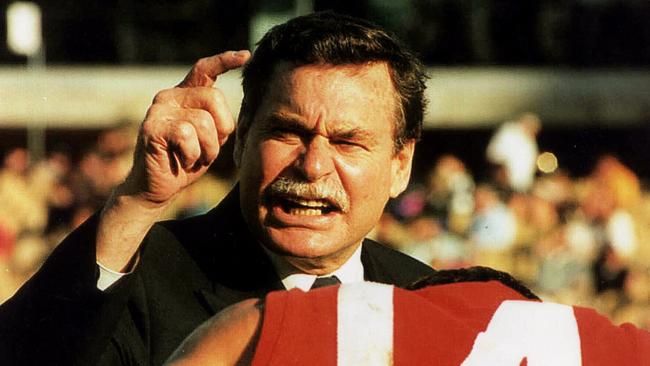
24. The “Prodigal Son” returns to Melbourne as coach, with Barassi appointed in an effort to lead the lowly club out of the wilderness. The Demons finish on the bottom, with one win, in his first year in 1981. Plays a central role in the game’s first hunt for overseas recruits. Among the players targeted in late 1984 was a tall, skinny kid from Dublin named Jim Stynes.
25. Makes an emotional pilgrimage to his father’s grave, in Libya, in 1984. “I had dreamt about visiting his grave over the years … it was a very emotional experience.”
26. Dons a red and blue bow-tie as he ends his time as Demons coach in the final round of 1985. Melbourne fails to make the finals in his five seasons in charge, but he sets them on a pathway to professionalism. The club makes the finals two years later and a Grand Final in 1988.
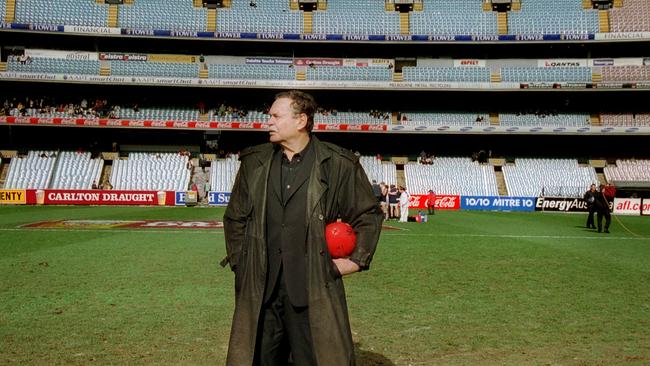
27. Comes out of retirement when he is asked to coach the desperately ailing Sydney Swans during 1993. After six losses under his rule, he oversees the Swans’ first win in 415 days — ending a run of 26 consecutive defeats — in Round 13, 1993. Coaches his 515th and final game, going out on a high when the Swans knock off Collingwood in the final round of 1995.
28. Alters his famous signature to mark his career in football, by adding the numbers 17 4 10 — 17 grand finals as a player and coach, four clubs (Melbourne, Carlton, North Melbourne and Sydney) and 10 premierships. “The funny thing is if you add the three numbers up, it comes to 31 (his famous guernsey number),” he said.
29. Celebrates his 70th year by undertaking a nine-day trek along the Kokoda Track.
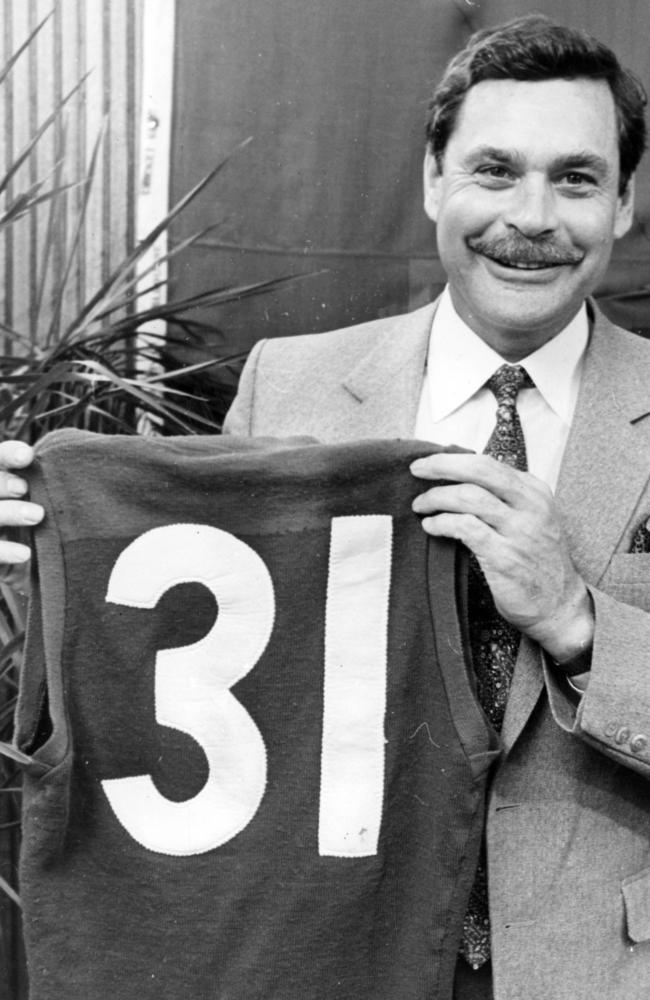
30. Comes to the aid of a woman being punched by a man on New Year’s Eve in St Kilda, in 2009, winning two awards for bravery and community spirit.
31. Belts out the Melbourne Football Club theme song for the Herald Sun and for the Demons who bring the 2021 premiership cup to his St Kilda home, just a few weeks after the club’s first premiership triumph since 1964




